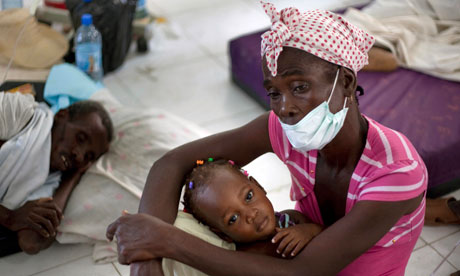A cholera epidemic in Haiti has reached Port-au-Prince after a remorseless march through the countryside that has killed hundreds and raised fears for those in the capital's slums and tent camps.
Health authorities confirmed the disease breached containment efforts and was now present in a city where much of the 3m population lived in dirty, cramped conditions.
Tests showed a three-year-old boy who was suffering from severe dehydration, nausea, vomiting and diarrhoea had the bacteria vibrio cholerae 01, the health ministry's executive director, Gabriel Timothee, told AP.
More than 100 other suspected cholera cases among city residents were also being tested, sounding alarm bells that an epidemic which started last month in the rural Artibonite valley to the north could claim many more lives.
Of 8,138 confirmed cases more than 544 people have died, most from shock brought on by dehydration. Authorities suspect there are tens of thousands of people infected.
Cases were detected in Port-au-Prince two weeks ago but they were from people said to have caught the disease in Artibonite before travelling to the capital.
The boy who was found to have traces of the bacteria in his faeces, in contrast, had not left the city, nor had his family had contact with people from the Artibonite valley, meaning Port-au-Prince had become a new location of infection. The child was treated with oral rehydration, intraveneous fluids and antibiotics at the Bernard Mevs/Project Medishare hospital and released.
At least 114 of the capital's suspected cholera cases are in the north-eastern slum of Cite Soleil. Dozens of treatment centres, each with just one entry and exit to control access, have been set up across the capital.
Authorities had hoped to contain the epidemic in the Artibonite region, about 40 miles north of the capital, but faster than they could distribute soap, clean water and advice about boiling food the disease found its way to the capital, still largely in ruins following January's earthquake, and to half of the country's 10 administrative departments.
The Artibonite river, which drains central Haiti, is suspected to have infected people who use it to bathe and drink. Hurricane Tomas swelled rivers and triggered floods and mudslides over the weekend, killing at least 20 and increasing the chance that cholera, which is transmitted through the consumption of contaminated water or food, would spread further.
"Standing water, mud, lack of garbage collection and limited sanitation availability make the camps a potential flashpoint for cholera outbreak," said Partners in Health, a US aid group.
The Centres for Disease Control and Prevention, a US agency, found Haiti's cholera closely matched a strain of the disease found in south Asia, prompting speculation it may have come from Nepalese UN peacekeepers stationed on a tributary of the Artibonite river.
The one piece of good news was there may be no more tropical storms this year. "I believe we are all done this hurricane season with dangerous storms capable of causing loss of life," Jeff Masters, a hurricane expert with Weather Underground, wrote in his blog.
Even so, much of Haiti is in a pitiful state. The earthquake killed about 300,000 people, destroyed infrastructure and left many survivors living in tents and rubble with poor diet and hygiene. Even before the disaster sanitation in Port-au-Prince was appalling but with so many homeless the level of what is termed "open defecation" had spiked. Many of the very young and elderly lacked protective immunity against disease, said the Pan American Health Organisation.
Government ministries and aid agencies were stretched by the floods and disease but the UN saw no reason to delay upcoming presidential and legislative election. "There are no objective reasons not to have elections on November 28. Technically, logistically, security, budget, all is in place," Edmond Mulet, the UN's top envoy to Hait, told Reuters.










